|
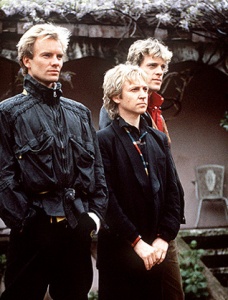 Nominally, the Police were punk rock, but that's only in the loosest sense of the term. The trio's nervous, reggae-injected pop/rock was punky, but it wasn't necessarily punk. All three members were considerably more technically proficient than the average punk or new wave band. The Police brought bristling energy and musical sophistication to the New Wave movement. They were among the first post-punk success stories, applying the succinct and speedy strictures of that genre to more challenging material that appealed to listeners of all ages and musical persuasions. Andy Summers had a precise guitar attack that created dense, interlocking waves of sounds and effects. Stewart Copeland could play polyrhythms effortlessly. And Sting, with his high, keening voice, was capable of constructing infectiously catchy pop songs. While they weren't punk, the Police certainly demonstrated that the punk spirit could have a future in pop music. As their career progressed, the Police grew considerably more adventurous, experimenting with jazz and various world musics. All the while, the band's tight delivery and mastery of the pop single kept their audience increasing, and by 1983, they were the most popular rock & roll band in the world. Though they were at the height of their fame, internal tensions caused the band to splinter apart in 1984, with Sting picking up the majority of the band's audience to become an international superstar.
Nominally, the Police were punk rock, but that's only in the loosest sense of the term. The trio's nervous, reggae-injected pop/rock was punky, but it wasn't necessarily punk. All three members were considerably more technically proficient than the average punk or new wave band. The Police brought bristling energy and musical sophistication to the New Wave movement. They were among the first post-punk success stories, applying the succinct and speedy strictures of that genre to more challenging material that appealed to listeners of all ages and musical persuasions. Andy Summers had a precise guitar attack that created dense, interlocking waves of sounds and effects. Stewart Copeland could play polyrhythms effortlessly. And Sting, with his high, keening voice, was capable of constructing infectiously catchy pop songs. While they weren't punk, the Police certainly demonstrated that the punk spirit could have a future in pop music. As their career progressed, the Police grew considerably more adventurous, experimenting with jazz and various world musics. All the while, the band's tight delivery and mastery of the pop single kept their audience increasing, and by 1983, they were the most popular rock & roll band in the world. Though they were at the height of their fame, internal tensions caused the band to splinter apart in 1984, with Sting picking up the majority of the band's audience to become an international superstar.
Stewart Copeland and Sting (born Gordon Sumner) formed the Police in 1977. Prior to the band's formation, Copeland, the son of a CIA agent, had attended college in California, before he moved to England and joined the progressive rock band Curved Air. Sting - nicknamed “Sting” because of a black-and-yellow jersey he wore - was a teacher and a ditch digger who played in jazz-rock bands, including Last Exit, on the side. The two musicians met at a local jazz club and decided to form a progressive pop band with guitarist Henri Padovani. For the first few months, the group played local London pubs. Soon, they were hired to appear as a bleached-blonde punk band in a chewing gum commercial. While the commercial provided exposure, it drew the scorn of genuine punkers. Late in 1977, the band released its first single, "Fall Out," on IRS, an independent label Stewart Copeland founded with his brother Miles, who was also the manager of the Police. The single was a sizable hit for an independent release, selling about 70,000 copies.
Padovani was replaced by Andy Summers, a veteran of the British Invasion, following the release of "Fall Out." Summers had previous played with Eric Burdon's second lineup of the Animals, the Zoot Money's Big Roll Band, the Kevin Ayers Band, and Neil Sedaka. The Police signed with A&M by the spring of 1978, committing to a contract that gave the group a higher royalty rate in lieu of a large advance. A&M released "Roxanne" in the spring of 1978, but it failed to chart. The Police set out on a tour of America in the summer of 1978 without any record to support, traveling across the country in a rented van and playing with rented equipment. Released in the fall of 1978, Outlandos d'Amour began a slow climb into the British Top Ten and American Top 30. Immediately after its release, the group began a U.K. tour supporting Alberto y los Trios Paranoias and released the "So Lonely" single. By the spring of 1979, the re-released "Roxanne" had climbed to number 12 on the U.K. charts, taking Outlandos d'Amour to number six. In the summer of 1979, Sting appeared in Quadrophenia, a British film based on the Who album of the same name; later that year, he acted in Radio On.
Preceded by the number one British single "Message in a Bottle," Reggatta de Blanc (fall 1979) established the group as stars in England and Europe, topping the U.K. charts for four weeks. Following its release, Miles Copeland had the band tour several countries that rarely received concerts from foreign performers, including Thailand, India, Mexico, Greece, and Egypt. Zenyatta Mondatta, released in the fall of 1980, became the Police's North American breakthrough, reaching the Top Ten in the U.S. and Canada; in England, the album spent four weeks at number one. "Don't Stand So Close to Me," the album's first single, became the group's second number one single in the U.K.; in America, the single became their second Top Ten hit in the spring of 1981, following the number ten placing of "De Do Do Do, De Da Da Da" in the winter. By the beginning of 1981, the Police were able to sell out Madison Square Garden. Capitalizing on their success, the band returned to the studio in the summer of 1981 to record their fourth album with producer Hugh Padgham. The sessions, which were filmed for a BBC documentary hosted by Jools Holland, were completed within a couple months, and the album, Ghost in the Machine, appeared in the fall of 1981. Ghost in the Machine became an instant hit, reaching number one in the U.K. and number two in the U.S. as "Every Little Thing She Does Is Magic" became their biggest hit to date.
Following their whirlwind success of 1980 and 1981, in which they were named the Best British Group at the first Brit Awards and won three Grammys, the band took a break in 1982. Though they played their first arena concerts and headlined the U.S. Festival, each member pursued side projects during the course of the year. Sting acted in Brimstone and Treacle, releasing a solo single, "Spread a Little Happiness," from the soundtrack; the song became a British hit. Copeland scored Francis Ford Coppola's Rumble Fish, as well as the San Francisco Ballet's King Lear, and released an album under the name Klark Kent; he also played on several sessions for Peter Gabriel. Summers recorded an instrumental album, I Advance Masked, with Robert Fripp. The Police returned in the summer of 1983 with Synchronicity, which entered the U.K. charts at number one and quickly climbed to the same position in the U.S., where it would stay for 17 weeks. Synchronicity became a blockbuster success on the strength of the ballad "Every Breath You Take." Spending eight weeks at the top of the U.S. charts, "Every Breath You Take" became one of the biggest American hits of all time; it spent four weeks at the top of the U.K. charts. "King of Pain" and "Wrapped Around Your Finger" became hits over the course of 1983, sending Synchronicity to multi-platinum status in America and Britain. By 1983. Rolling Stone magazine deemed them “today’s best-loved band.” The Police supported the album with a blockbuster, record-breaking world tour that set precedents for tours for the remainder of the '80s. Once the tour was completed, the band announced they were going on "sabbatical" in order to pursue outside interests.
The Police never returned from sabbatical. During the Synchronicity tour, personal and creative tensions between the bandmembers had escalated greatly, and they had no desire to work together for a while. Sting began working on a jazz-tinged solo project immediately, releasing The Dream of the Blue Turtles in 1985. The album became an international hit, establishing him as a commercial force outside of the band. Copeland and Summers demonstrated no inclination to follow their bandmate's path. Copeland recorded the worldbeat exploration The Rhythmatist in 1985, and continued to compose scores for film and television; he later formed the prog rock band Animal Logic. With his solo career -- which didn't officially begin until the release of 1987's XYZ -- Summers continued his art rock and jazz fusion experiments; he also occasionally collaborated Fripp and John Etheridge.
During 1986, the Police made a few attempts to reunite, playing an Amnesty International concert and attempting to record a handful of new tracks for a greatest-hits album in the summer. As the studio session unraveled, it became apparent that Sting had no intention of giving the band his new songs to record, so the group re-recorded a couple of old songs, but even those were thrown off track after Copeland suffered a polo injury. Featuring a new version of "Don't Stand So Close to Me," the compilation Every Breath You Take: The Singles was released for the 1986 Christmas season, becoming the group's fifth straight British number one and their fourth American Top Ten. Following its release, the group quietly disbanded, reuniting to play Sting's marriage in 1992. That same year, a Greatest Hits album was released in the U.K. The following year, the box set Message in a Box: The Complete Recordings was released, followed in 1995 by the double album Live. The Police were inducted into the Rock & Roll Hall of Fame in 2003.
In early 2007, reports surfaced that the trio would reunite for a tour to mark their 30th anniversary, over 20 years since their 'final' split in 1986. The concerts would coincide with Universal Music (current owners of the A&M label) re-releasing some material from the band's back catalogue. The following statement was released on behalf of the band by a spokesman at Interscope Geffen A&M Records and posted on Sting's official website: "As the 30th anniversary of the first Police single approaches, discussions have been underway as to how this will be commemorated. While we can confirm that there will indeed be something special done to mark the occasion, the depth of the band's involvement still remains undetermined."
On January 22, 2007, the punk wave magazine Side-Line broke the story that The Police would reunite for the Grammys, adding that the song performed would be "Roxanne". Side-Line also announced in its news coverage that The Police were to embark on a massive tour bringing them to cities all over the world. Billboard magazine later confirmed the rumours, quoting Andy Summers who had discussed earlier in 2006 how the band could have continued post-Synchronicity: "The more rational approach would have been, 'OK, Sting, go make a solo record, and let's get back together in two or three years. I'm certain we could have done that. Of course we could have. We were definitely not in a creative dry space. We could have easily carried on, and we could probably still be there. That wasn't to be our fate. It went in another way. I regret we never paid it off with a last tour."
The Police opened the 49th Annual Grammy Awards on February 11, 2007 in Los Angeles, California, announcing "We're The Police. And we're back!" before launching into "Roxanne." A&M Records, the band's record company, promoted the 2007–2008 reunion tour as the 30th anniversary of the release of their first single and not indeed that of the band's creation. ABC reported, "This year marks the 30th anniversary of the release of 'Roxanne,' the single that broke the Police in the United States." The single was released in April 1978.
The Police opened their Reunion Tour in Vancouver on May 28 in front of 22,000 fans at one of two nearly sold-out concerts. Stewart Copeland gave a scathing review of the show on his own website, which the press picked up as a feud occurring two gigs into the tour. It was only meant to be tongue-in-cheek and the band took it as light-hearted as it was intended. In October 2007 the group played the largest gig of the reunion tour in Dublin, Ireland, in front of 82,000 fans. The group also cancelled their second planned concert in Antwerp, Belgium on October 9, 2007, as Sting suffered from pharyngitis.
The Police continued their reunion tour in 2008, and locations included New Zealand, Australia, Singapore, Macau, Japan, Canada, USA, France, Germany, Norway, Denmark, UK, Serbia, Poland, Argentina and Brazil, where they played for 75,000 people. Henry Padovani joined the band on stage for the final encore of their show in Paris on September 29. The Police as a 4-piece band played "Next to You" from the band's first album Outlandos d'Amour.
The group were headliners at the TW Classic festival in Werchter, Belgium on June 7, 2008. The Police also headlined the last night of the 2008 Isle of Wight Festival on June 15, 2008,[12] in addition to headlining the Sunday night at Hard Rock Calling (previously called Hyde Park Calling) on June 29. The Police performed on June 24 in Belgrade (Serbia) with Counting Crows for 52,000 sold tickets.
In February 2008, The Police announced that once they were finished touring, they would break up again. According to Sting, "There will be no new album, no big new tour, once we're done with our reunion tour, that's it for the Police."
The final show of the tour was held August 7 at Madison Square Garden in New York City and was opened by The B52's. The group earlier announced the show while donating $1 million to New York Mayor Michael Bloomberg's initiative to plant one million trees in the city by 2017. Proceeds went towards arts programming for the city's two public television stations. During the entire tour they sold 3.7 million tickets and grossed $358 million, making it the third highest grossing tour of all time.
The Police and Best Buy announced August 4, 2008 that they would release a collector's set entitled "Certifiable: Live in Buenos Aires." The set will include an entire concert recorded live in Buenos Aires, Argentina on the tour. The set will come in the following packages: 2DVD/2CD, 1 Blu-Ray Disc/2CD, and 3 premium 180-gram vinyl LPs with MP3 file key. The set will include bonus footage, including a documentary shot by Stewart's son Jordan entitled "Better Than Therapy." The set was released on November 11, 2008 at Best Buy.
All told, the Police have sold more than 50 million albums worldwide, and were the highest earning musicians in the world during 2008, as a result of their reunion tour. Rolling Stone ranked The Police number 70 on their list of the 100 Greatest Artists of All Time.
|


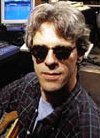


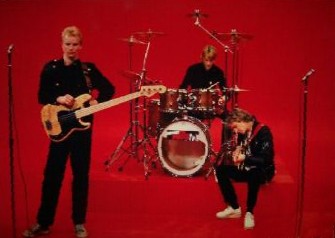
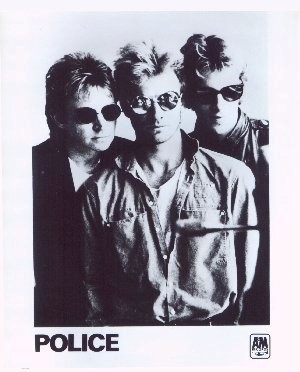


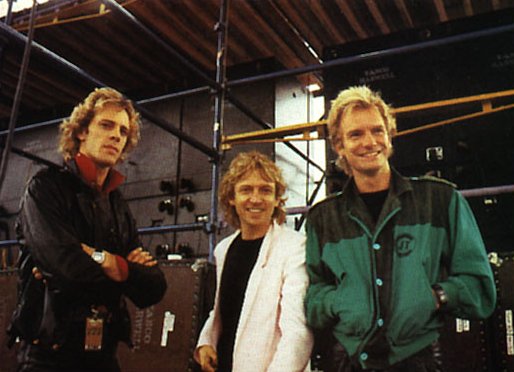
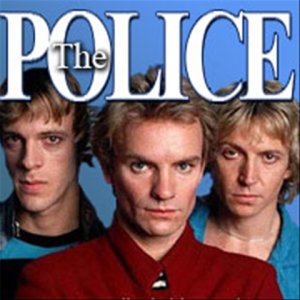
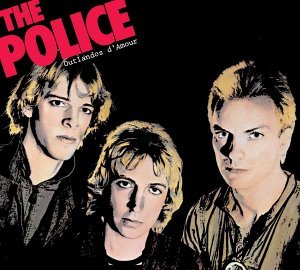
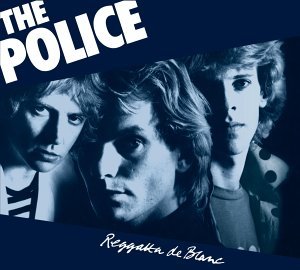
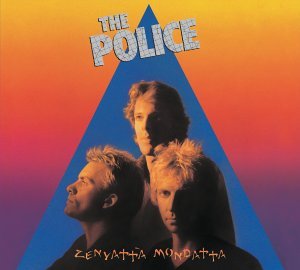
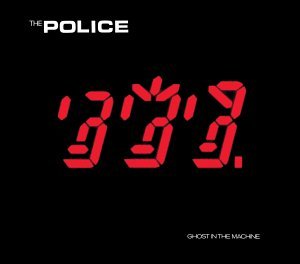
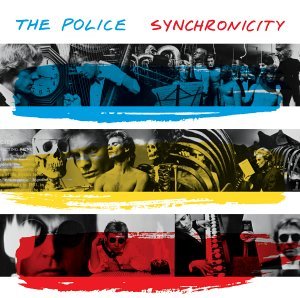
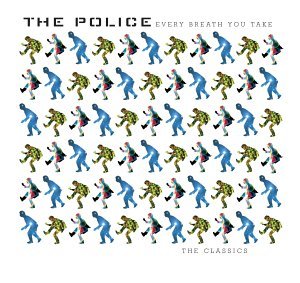
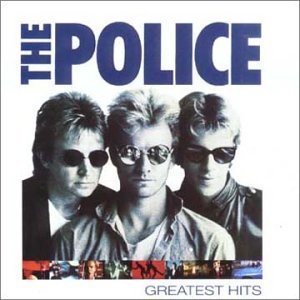
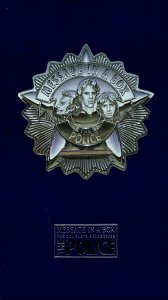
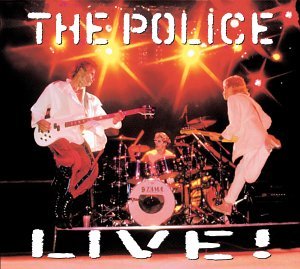
 Nominally, the Police were punk rock, but that's only in the loosest sense of the term. The trio's nervous, reggae-injected pop/rock was punky, but it wasn't necessarily punk. All three members were considerably more technically proficient than the average punk or new wave band. The Police brought bristling energy and musical sophistication to the New Wave movement. They were among the first post-punk success stories, applying the succinct and speedy strictures of that genre to more challenging material that appealed to listeners of all ages and musical persuasions. Andy Summers had a precise guitar attack that created dense, interlocking waves of sounds and effects. Stewart Copeland could play polyrhythms effortlessly. And Sting, with his high, keening voice, was capable of constructing infectiously catchy pop songs. While they weren't punk, the Police certainly demonstrated that the punk spirit could have a future in pop music. As their career progressed, the Police grew considerably more adventurous, experimenting with jazz and various world musics. All the while, the band's tight delivery and mastery of the pop single kept their audience increasing, and by 1983, they were the most popular rock & roll band in the world. Though they were at the height of their fame, internal tensions caused the band to splinter apart in 1984, with Sting picking up the majority of the band's audience to become an international superstar.
Nominally, the Police were punk rock, but that's only in the loosest sense of the term. The trio's nervous, reggae-injected pop/rock was punky, but it wasn't necessarily punk. All three members were considerably more technically proficient than the average punk or new wave band. The Police brought bristling energy and musical sophistication to the New Wave movement. They were among the first post-punk success stories, applying the succinct and speedy strictures of that genre to more challenging material that appealed to listeners of all ages and musical persuasions. Andy Summers had a precise guitar attack that created dense, interlocking waves of sounds and effects. Stewart Copeland could play polyrhythms effortlessly. And Sting, with his high, keening voice, was capable of constructing infectiously catchy pop songs. While they weren't punk, the Police certainly demonstrated that the punk spirit could have a future in pop music. As their career progressed, the Police grew considerably more adventurous, experimenting with jazz and various world musics. All the while, the band's tight delivery and mastery of the pop single kept their audience increasing, and by 1983, they were the most popular rock & roll band in the world. Though they were at the height of their fame, internal tensions caused the band to splinter apart in 1984, with Sting picking up the majority of the band's audience to become an international superstar.